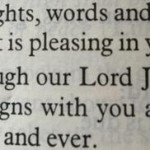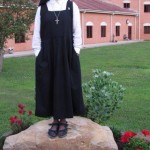The self is more distant than any star…
— G. K. Chesterton
Over at Inside Catholic, Irene Lagan has a moving post; through conversation with a nun in Rome, she finds herself thinking of a remarkable young woman from Rwanda:
Our conversation recalled an experience I had last year when I met Immaculee Ilibagiza. Immaculée is the author of Left to Tell: Discovering God Amidst the Rwandan Holocaust, an account of her survival of the Rwandan genocide…I realized that Immaculée’s message is timely both for Advent, and in light of the fact that the Rwandan conflict is ongoing, now in the neighboring Democratic Republic of the Congo…
[…]
Immaculee was confined to a small bathroom together with other women in hiding for several months. Her confinement was a trial during which she was forced to confront herself. As she remembered, she was full of rage, anger, hatred, and self-pity. Immaculée turned to the mysteries of the rosary, forcing herself to focus on each mystery and the divine mercy chaplet throughout her waking hours. Often, the voices of hatred outside the bathroom were audible, as those who sought nothing less than her complete destruction hunted for her. But the natural anger and thoughts of revenge that welled up within her threatened to consume her, and compelled her to cling with every ounce of will she could muster to God…The time in captivity was essential: without this period of intense purification of mind and heart, Immaculée would not have been able to encounter her family’s murderers with forgiveness. But having herself experienced the threat of being consumed by hatred, having chosen to turn to God and to trust in his promise of mercy, she came to know His peace — and was transformed.
You’ll want to read Irene’s whole post, and also check out Immaculée’s site and her latest book, Led By Faith: Rising from the Ashes of the Rwandan Genocide, which sounds tremendous.
But in reading Irene’s musings, I was struck by this line:
Her confinement was a trial during which she was forced to confront herself.
That reminded me of this line which I quoted last week, from Sr. Catherine Perry’s novel, Amata Means Beloved:
“The longer I’m in the monastery the more I marvel at the mystery of a vocation. Over and over I see women come, enthused to give everything to God…Then they enter the monastery and bang-0!- They are faced with their own weaknesses, frailties and sins. And they don’t like it! They want to deny it, make it go away but they must face their frailty- they must face that they are part of the human race. Not only that, they have to realize and accept that only by God’s grace is any of this life possible.”
Everyone gets a turn in the white-hot crucible; no one escapes it without their share of suffering. That crucible does not have to be as dramatic and menacing as Immaculée’s, or as public as Ted Kennedy’s; it can be as seemingly passive – and completely voluntary – as submitting to a radical call in religion, or the sort of silent and interior agonies that I suspect eat at most people who, on the surface, appear to “have it all,” or at least to “have it all together.”
In every case, whether public, private, passive or past-imagining, the key component of the crucible is the unbearable confrontation with the self. We’d rather do anything else but deal with our true selves – shove iPod buds into our ears, scream about politics, create havoc in our lives, anything to keep the noise going – because silence allows the heart to be heard, and once the brutal truths of our own brokenness are brought to the fore, they must be dealt with – with honesty and bruising courage.
Or we must run away by any means necessary, and that never ends well.
We all know – deep down we know it – that we can harbor the most hateful, murderous impulses. Michel Montaigne once wrote,
“There is no man so good, who, were he to submit all his thoughts and actions to the laws, would not deserve hanging ten times in his life.”
Mother Mary Francis, PPC, expresses the same idea differently in A Right to be Merry:
“True humility is when you realize that there is no sin you could not commit.”
Facing that truth within yourself is an interior bonfire, and walking through it is no picnic. For myself, I can attest that it is only through God’s grace that I have been able to make my way even partway through. Every day, sometimes several times in a day, I realize that I am not fully out of it, that I have a thigh and forearm still roasting in the flames, and that they will remain there until I am able to open myself more fully, and even more fully to the honesty, healing and unfathomable love that comes with trust.
Trust is so hard, isn’t it? Part and parcel with obedience, it may be the hardest thing.
And then, of course, there is the paradox that whenever you trust, and open yourself to healing, it acts like new air to a flame, and some other part of the interior house explodes and needs addressing. It takes a lifetime. Unless God mercifully sees fit to haul you through something so intense and concentrated, as in Immaculée’s case, that your house becomes completely rebuilt in Christ. And that’s another paradox – a very Catholic one, I think – the understanding that God often allows the harshest flames to devour those He wishes to gift most fully – and so there is mercy in the tumult and the pain. Go figure.
In Advent, we are alert for the Coming, and we consider the Magi following a star. The star leads them to the Christ. May the Christ, the Logos, the Word Incarnate – Prince of Peace, Lord of Lords, Wonderful Counselor, Emmanu-el – by his grace and mercy, lead us safely to the distant, beckoning star that is ourselves, in all our deepest longings, our fears, our agonies, our joys, our hatreds and our adorations…and then lead us through the fire, into the place of luminous grace.











